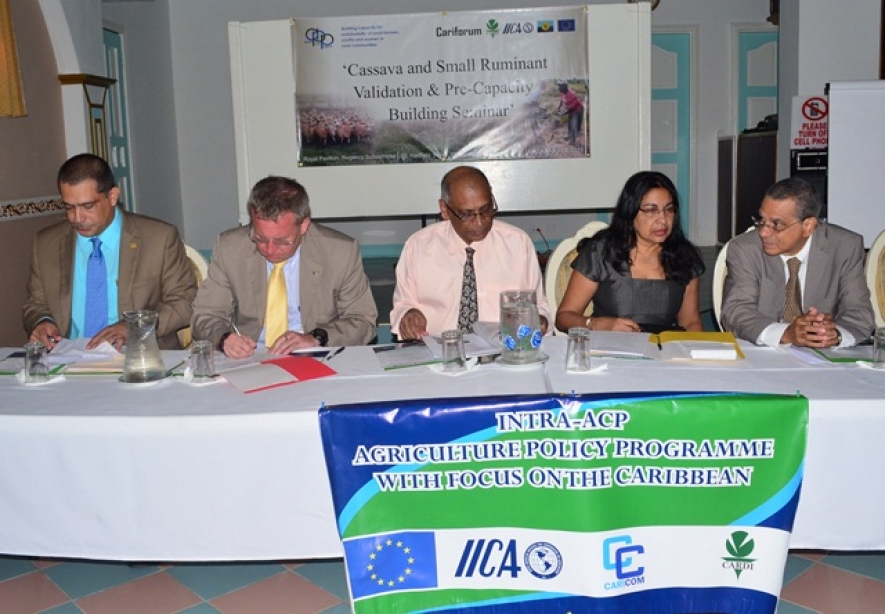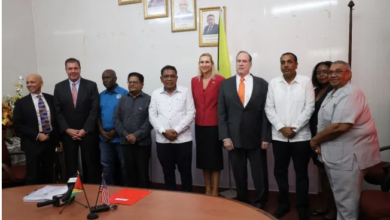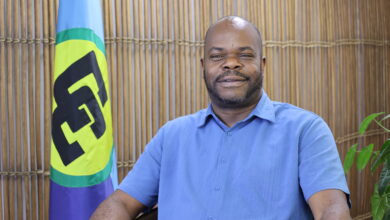As part of component three of the Agriculture Policy Programme (AAP), which aims to develop enterprises, through improved market linkages, the Ministry of Agriculture, in partnership with The Inter-American Institute for Cooperation on Agriculture (IICA), hosted a cassava and small ruminant validation seminar, today.
This event which was held at the Regency hotel, Hadfield Street, targeted farmers from across the country, sought to build capacity among the participants and engaging them on the validation of the analysis of constraints and opportunities in Guyana.
Guyana is one of several countries to benefit from the AAP, a programme funded under the 10th European Development Fund (EDF) between the European Commission (EC) and the IICA as the implementing agency. The Caribbean Agricultural Research and Development Institute (CARDI), and the CARICOM Secretariat are partners in the implementation.

The APP, which was launched in 2013 and has a four-year duration, is aimed at boosting agriculture in CARIFORUM countries (Forum of the Caribbean Group of African, Caribbean and Pacific (ACP) States), through the development of small holder agricultural producers and entrepreneurs. Small farmers, fisher-folk, small-scale processors and traders, including organised associations and networks and women and youth are among the beneficiaries.
Minister of Agriculture, Leslie Ramsammy, noted that there were some challenges in implementing the programme; however, he said that the most important thing is that it is now being rolled out, “…And I do hope that for our people’s sake in the Caribbean that indeed all of the objectives, the goals that were intended when we conceptualised this programme and signed this agreement would be achieved.”
He thanked all the partners for the roles they played in the implementation of the programme.
The AAP, the minister said is critical to the continuing development of the region even as it continues to confront global, regional and national challenges.
Minister Ramsammy also spoke of the importance of capacity building among agriculture entrepreneurs. “I tend to stay away as much as possible from using the term farmers…we have come to separate farming from other businesses. Farming is an entrepreneurial activity like any other business activity. For too long in our country, farming has been thought of as peasant activity, and it is time that we abandon that notion. The APP is intended to be implemented on a trajectory that farming is serious business and that farming constitutes a critical component of the economic platform and framework, and therefore the platform for social development in our various countries, and Guyana is particularly sensitive to this notion,” Minister Ramsammy explained.
In Guyana, agriculture has played a significant role in its economic and social development; hence, farmers have been recognised for their role.

The minister also mentioned the high food import bill of the region, noting that most of what is imported can be produced by the region. “It is for me an embarrassment that we import mutton and lamb and small ruminant products into this region, it is an embarrassment that we must bring to an end…this region can produce all of the small ruminant meat and products that we need, and indeed we can produce enough to meet our demands and develop greater market to generate greater wealth,” Minister Ramsammy emphasised.
Meanwhile, Head of the Delegation European Union (EU), Ambassador Robert Kopecky, noted that Guyana is leading in the push to self-sustainability in agriculture production of the Caribbean, and he commended the country for developing its potential.
Ambassador Kopecky highlighted that the programme has encountered some challenges which had an impact on the bases of its implementation. However, the seminar marks a step forward in the implementation of the APP. He said that the EU and IICA are also embarking on another programme, which has to do with sanitary and phyto-sanitary measures, and which is also funded in the framework of the 10th EU fund worth €165M. The two programmes have a combined value of €20.3M and signal the EU’s commitment in partnering with the Caribbean in the area of agriculture.
At the event, an agreement was also signed between the National Agricultural Research and Extension Institute (NAREI) and CARDI to develop commodities such as cereal, greens, legumes and pepper. There is also an aspect of climate change and improvement of germplasm.






